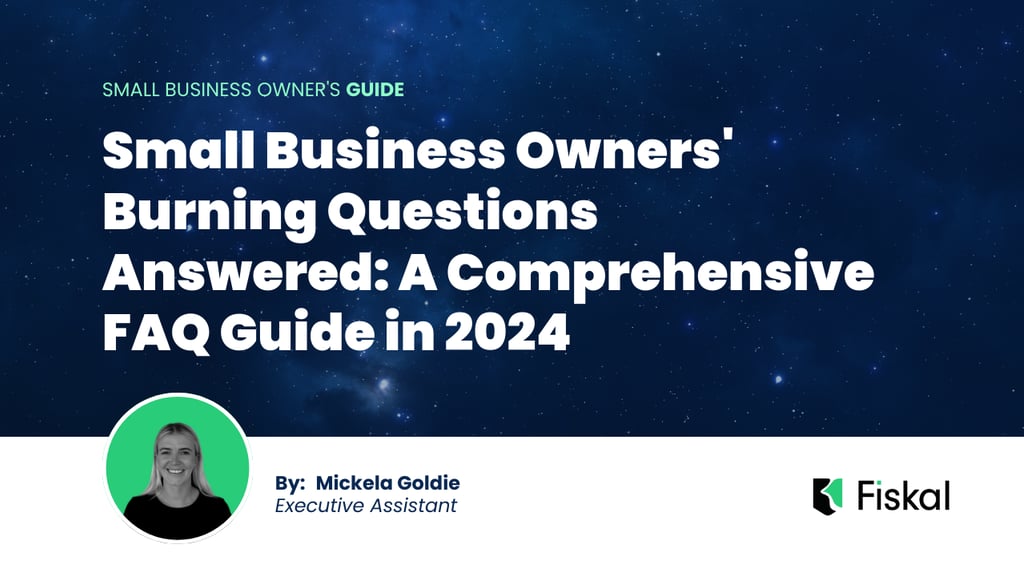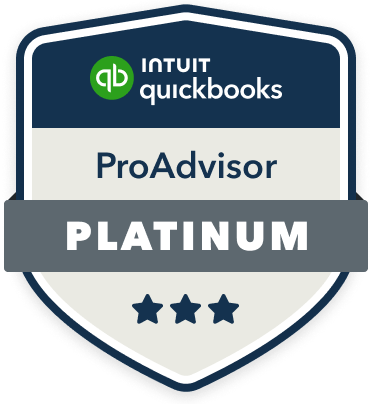Small Business Owners' Burning Questions Answered: A Comprehensive FAQ Guide in 2024
In 2024, small business owners face a myriad of questions and challenges as they strive to navigate an ever-changing business landscape. From managing cash flow to developing effective marketing strategies, the burning questions that keep these entrepreneurs up at night seem to multiply by the day. That's why we've created this comprehensive FAQ guide to help small business owners find the answers they're searching for. In this guide, we'll address the most common questions and provide expert insights to help you overcome obstacles and achieve business success. Whether you're wondering how to optimize your website for search engines, what funding options are available to entrepreneurs, or how to create a standout brand in a crowded market, we've got you covered.
SYSTEMS AND SOFTWARE


We understand that every business is unique, which is why we've tailored our guide to address the specific challenges faced by small business owners in 2024. So grab a cup of coffee, sit back, and let us help you find the answers you need to propel your business forward. Let's tackle those burning questions together.
How to Start a Small Business: Steps and Considerations
Starting a small business can be an exciting but challenging endeavor. To set yourself up for success, there are several important steps and considerations to keep in mind.
1. Identify your business idea: The first step is to identify a business idea that aligns with your skills, passions, and market demand. Conduct market research to ensure there is a viable market for your product or service.
2. Create a business plan: A well-thought-out business plan is essential for securing funding and guiding your business's growth. Your plan should include a description of your business, target market analysis, marketing strategies, financial projections, and more.
3. Choose a legal structure: Selecting the right legal structure for your business is important for tax purposes and personal liability. Options include sole proprietorship, partnership, limited liability company (LLC), and corporation. Consult with a legal professional to determine the best option for your specific situation.
4. Register your business: Registering your business is necessary to establish its legal identity. This typically involves registering with local, state, and federal authorities, obtaining necessary licenses and permits, and registering your business name.
5. Set up your finances: Establish a separate business bank account and implement a bookkeeping system to track income and expenses. Consider working with an accountant to ensure compliance with tax regulations and to optimize your financial management.
6. Build your team: Depending on the scale of your business, you may need to hire employees or contractors. Develop a hiring process, create job descriptions, and ensure compliance with employment laws.
Remember, starting a business requires dedication, hard work, and perseverance. Stay focused on your goals and continuously adapt your strategies based on market feedback and trends.
Legal and Financial Considerations for Small Business Owners
Running a small business involves various legal and financial considerations. Understanding and complying with these requirements is crucial for the long-term success of your business.
1. Legal compliance: Familiarize yourself with the legal obligations related to your industry and location. This may include obtaining licenses and permits, adhering to zoning regulations, maintaining proper insurance coverage, and protecting intellectual property.
2. Contracts and agreements: Consult with an attorney to draft or review contracts, such as client agreements, vendor contracts, and employee agreements. Clear and legally binding contracts can help protect your business interests and minimize potential disputes.
3. Intellectual property protection: If your business involves unique inventions, products, or brand elements, consider seeking intellectual property protection through trademarks, copyrights, or patents. This can safeguard your business's assets and prevent others from copying or stealing your ideas.
4. Tax obligations: Understand your tax obligations and ensure timely payment of taxes. Familiarize yourself with applicable tax laws, deductions, and credits to optimize your tax strategy. Consider working with a tax professional to ensure accuracy and compliance.
5. Financial management: Develop a sound financial management system to track income, expenses, and cash flow. Regularly review financial statements and use them to make informed business decisions. Consider utilizing accounting software to streamline financial processes.
6. Insurance coverage: Protect your business from unforeseen risks by obtaining appropriate insurance coverage. This may include general liability insurance, professional liability insurance, property insurance, and workers' compensation insurance.
By staying informed and proactive in addressing legal and financial considerations, you can safeguard your business's interests and minimize potential risks.
Marketing and Advertising for Small Businesses
Effective marketing and advertising strategies are essential for small businesses to attract customers and generate revenue. Here are some key considerations to keep in mind when developing your marketing plan:
1. Define your target audience: Understand who your ideal customers are and what motivates them. Conduct market research to gather insights about their preferences, needs, and behaviors. Use this information to tailor your marketing messages and tactics.
2. Create a compelling brand: Develop a strong brand identity that resonates with your target audience. This includes designing a memorable logo, crafting a unique brand story, and maintaining consistent visual elements across all marketing channels.
3. Build an online presence: In today's digital age, having an online presence is crucial for small businesses. Create a professional website that is user-friendly and optimized for search engines. Establish profiles on relevant social media platforms and engage with your audience regularly.
4. Content marketing: Develop a content marketing strategy to provide value to your target audience and establish your expertise in your industry. Create high-quality blog posts, videos, podcasts, or infographics that address your audience's pain points and offer solutions.
5. Search engine optimization (SEO): Optimize your website and online content to rank higher in search engine results. Conduct keyword research to identify relevant keywords and incorporate them naturally into your website copy and content. Focus on creating informative and engaging content that appeals to both search engines and human readers.
6. Paid advertising: Consider investing in paid advertising channels, such as pay-per-click (PPC) advertising or social media ads. Set clear goals, target your ads to a specific audience, and continuously monitor and optimize your campaigns to maximize ROI.
Remember, effective marketing requires ongoing analysis and adaptation. Monitor your marketing efforts, track key metrics, and make data-driven decisions to continuously improve your strategies.
Hiring and Managing Employees for Small Businesses
As your small business grows, hiring and managing employees becomes a critical aspect of your operations. Here are some considerations to keep in mind when building and managing your team:
1. Define job roles and responsibilities: Clearly define the roles and responsibilities of each position within your organization. This helps ensure that employees understand their duties and can contribute effectively to the business.
2. Recruitment and hiring: Develop a recruitment process that attracts top talent. Create compelling job descriptions, advertise through relevant channels, and conduct thorough interviews and background checks. Consider utilizing recruitment agencies or online job platforms to streamline the hiring process.
3. Onboarding and training: Once you've hired new employees, provide a comprehensive onboarding process to help them integrate into the company culture and understand their roles. Offer ongoing training and development opportunities to enhance their skills and knowledge.
4. Employee engagement and retention: Foster a positive work environment that promotes employee engagement and retention. Recognize and reward employee achievements, encourage open communication, and provide opportunities for career growth and advancement.
5. Performance management: Implement a performance management system to evaluate employee performance and provide constructive feedback. Set clear goals and expectations, conduct regular performance reviews, and address any performance issues proactively.
6. Legal compliance: Stay up to date with employment laws and regulations to ensure compliance. This may include adhering to minimum wage laws, providing a safe work environment, and following anti-discrimination policies.
By focusing on hiring the right people, fostering a positive work culture, and providing ongoing support and development, you can build a strong and motivated team that contributes to the success of your business.
Technology and Digital Tools for Small Businesses
Leveraging technology and digital tools can streamline operations, enhance productivity, and improve customer experiences for small businesses. Here are some essential technologies to consider:
1. Customer relationship management (CRM) software: CRM software helps you manage and track customer interactions, sales pipelines, and marketing campaigns. It allows you to centralize customer data, automate processes, and improve customer relationship management.
2. Accounting software: Utilize accounting software to simplify financial management tasks, such as invoicing, expense tracking, and financial reporting. This can save time, improve accuracy, and provide valuable insights into your business's financial health.
3. Project management tools: Project management tools help you organize and track tasks, deadlines, and project timelines. They enable effective collaboration among team members, ensuring that projects are completed on time and within budget.
4. E-commerce platforms: If you sell products online, consider utilizing e-commerce platforms that provide a user-friendly interface, secure payment processing, and inventory management capabilities. This allows you to reach a wider customer base and streamline online sales.
5. Communication and collaboration tools: Invest in communication and collaboration tools, such as video conferencing software, team messaging platforms, and cloud-based document sharing. These tools facilitate seamless communication and collaboration among remote team members.
6. Website analytics: Use website analytics tools, such as Google Analytics, to track website traffic, user behavior, and conversion rates. This data can help you identify areas for improvement and optimize your website's performance.
Remember to carefully evaluate your business's needs and select technologies that align with your goals and budget. Regularly review and update your technology stack to stay competitive and leverage the latest advancements.
Small Business Funding Options: Loans, Grants, and Crowdfunding
Access to funding is crucial for small businesses to start and grow. Here are some common funding options to consider:
1. Traditional bank loans: Approach banks or credit unions to inquire about small business loans. Prepare a comprehensive business plan, financial statements, and collateral (if required) to increase your chances of approval.
2. Small Business Administration (SBA) loans: The SBA offers various loan programs specifically designed for small businesses. These loans often have favorable terms and lower interest rates compared to traditional bank loans.
3. Grants: Research and apply for grants offered by government agencies, nonprofit organizations, or private foundations. Grants are typically awarded based on specific criteria, such as industry, location, or business size.
4. Crowdfunding: Utilize crowdfunding platforms to raise funds from a large number of individuals. Create a compelling campaign, offer incentives to backers, and leverage your network and social media to promote your campaign.
5. Angel investors: Seek funding from angel investors, who are typically high-net-worth individuals looking to invest in promising startups. Prepare a compelling pitch deck and be prepared to give up equity in your business in exchange for investment.
6. Venture capital (VC): If your business has high growth potential, consider seeking funding from venture capital firms. VC firms invest in startups in exchange for equity and often provide guidance and mentorship.
Remember, securing funding requires careful planning, preparation, and persistence. Research each funding option thoroughly and determine which one aligns best with your business's needs and goals.
Common Challenges and Solutions for Small Business Owners
Small business owners often face common challenges that can hinder growth and success. Here are some key challenges and strategies to overcome them:
1. Limited resources: Small businesses often have limited financial and human resources. To overcome this challenge, focus on prioritizing tasks, outsourcing non-core functions, and leveraging technology to automate and streamline processes.
2. Competition in a crowded market: In a saturated market, standing out can be challenging. Differentiate your business by offering unique value propositions, providing exceptional customer service, and continuously innovating.
3. Cash flow management: Poor cash flow management can lead to financial difficulties. Implement effective cash flow forecasting, negotiate favorable payment terms with suppliers, and consider alternative financing options during lean periods.
4. Adapting to technology changes: Technology is constantly evolving, and staying up to date can be daunting. Embrace a culture of continuous learning, invest in employee training, and seek expert guidance to navigate technological advancements.
5. Managing growth: Rapid growth can bring its own set of challenges. Ensure you have scalable systems and processes in place, hire strategically, and maintain clear communication to effectively manage growth.
6. Customer acquisition and retention: Acquiring and retaining customers is a constant challenge. Invest in targeted marketing strategies, build strong customer relationships, and consistently deliver exceptional products or services.
By proactively addressing these challenges and implementing effective strategies, you can overcome obstacles and position your business for long-term success.
Success Stories and Lessons from Small Business Owners
Learning from the experiences of successful small business owners can provide valuable insights and inspiration. Here are some success stories and lessons to motivate and guide you:
1. John's Coffee: John started a small coffee shop in a competitive market. By focusing on quality, creating a warm ambiance, and engaging with the local community, John's Coffee became a beloved neighborhood spot, attracting loyal customers.
Lesson: Building a strong brand and fostering a sense of community can differentiate your business in a crowded market.
2. Sarah's Skincare: Sarah launched her own line of natural skincare products. By leveraging social media influencers, offering personalized customer experiences, and consistently delivering high-quality products, Sarah's Skincare gained a loyal following and expanded into multiple retail locations.
Lesson: Embracing social media and providing exceptional customer experiences can help small businesses thrive in the digital age.
3. Mark's Home Services: Mark started a home services company, specializing in handyman services. By consistently delivering excellent customer service, offering transparent pricing, and leveraging online reviews and referrals, Mark's Home Services became the go-to provider in the local area.
Lesson: Prioritizing customer satisfaction and reputation management can lead to long-term success and growth.
Conclusion: Empowering Small Business Owners through Comprehensive FAQs
In conclusion, small business owners in 2024 face numerous challenges and burning questions. From starting a business to managing finances, marketing effectively, hiring and managing employees, leveraging technology, securing funding, and overcoming common challenges, this comprehensive FAQ guide aims to provide answers and expert insights to empower small business owners.
Remember, each small business journey is unique, and the road to success may have its twists and turns. Stay resilient, continuously adapt to market changes, and leverage the resources and knowledge available to you. With the right strategies, determination, and support, you can navigate the business landscape and achieve your goals. So, embrace the burning questions and contact us at Fiskal for even more answers to these questions. We have worked with multiple new businesses and have a vast knowledge of things that happen in those first few years.












